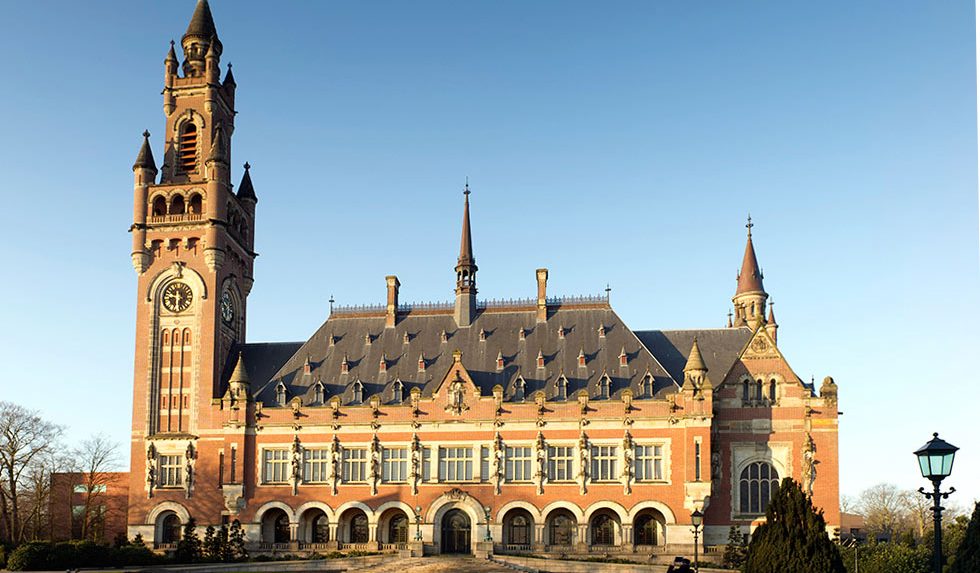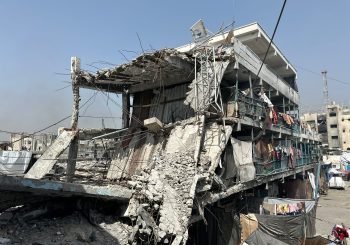South Africa filed an application on 29 December to begin proceedings against Israel at the International Court of Justice (ICJ) for alleged violations of the Genocide Convention and asked the ICJ to order measures to halt Israel’s actions that violate the convention amid its war on Gaza.
In its application to the ICJ, the UN’s main judicial body, South Africa claimed that Israel’s acts are “genocidal in character,” arguing that they are designed to bring about the destruction of a substantial portion of the Palestinians, namely the Palestinians in Gaza.
The ‘Convention on the Prevention and Punishment of the Crime of Genocide’ defines the crime as certain acts, such as killing and causing serious bodily or mental harm, committed “with intent to destroy, in whole or in part, a national, ethnical, racial or religious group.”
The African state added that no attack on a state’s territory, no matter how serious, may justify violations of the Genocide Convention.
“It is important to place the acts of genocide in the broader context of Israel’s conduct towards Palestinians during its 75-year-long apartheid, its 56-year-long belligerent occupation of Palestinian territory, and its 16-year-long blockade of Gaza,” South Africa wrote in its application.
It also requested the ICJ to order provisional measures to immediately “halt all military attacks that constitute or give rise to violations of the Genocide Convention.”
Provisional measures issued by the ICJ are binding, but not always adhered to. In 2022, the ICJ issued provisional measures ordering Russia to halt its military operations in Ukraine, but Russia ignored the order.
Israel’s Ministry of Foreign Affairs spokesperson, Lior Haiat, dismissed South Africa’s application as “blood libel.”
“South Africa’s claim lacks both a factual and a legal basis, and constitutes a despicable and contemptuous exploitation of the Court,” Haiat said in a statement on 29 December.
“Israel has made it clear that the residents of the Gaza Strip are not the enemy, and is making every effort to limit harm to civilians and to facilitate the entry of humanitarian aid to the Gaza Strip,” he added.
Israel killed over 21,500 Palestinians, most of whom are women and children, in Gaza since 7 October, and injured almost 56,000 others.
The Genocide Convention allows state parties to submit cases to the ICJ when a state suspects genocide is being committed. It provides the legal basis for both the punishment of genocide and the obligation to prevent it.
Genocide, conspiracy to commit genocide, direct and public incitement to commit genocide, attempt to commit genocide, and complicity to commit genocide are all punishable, according to the treaty.
The convention was drafted in 1948 and entered into force in 1951.
The ICJ issued a landmark advisory opinion in 2004 declaring the illegality of the separation wall between the West Bank and Israel, and concluding that Israel does not have a right to self-defense against the territory it occupies.
Though ICJ rulings are binding when its jurisdiction is mutually accepted by disputing parties or established through treaties such as the Genocide Convention, advisory opinions are not binding but carry significance in international law.
THE CONFLICT SO FAR
After a surprise attack led by Hamas on 7 October on a number of southern Israeli towns which resulted in the deaths of an estimated 1,200 people and more than 220 being taken hostage by Hamas, Israel launched a retaliatory bombing campaign against what it describes as ‘terrorist targets’ in the Gaza Strip.
Over 21,500 Palestinians have been killed by Israel in the Gaza Strip — including nearly 9,000 children — and almost 56,000 others injured. Meanwhile, at least 300 Palestinians have been killed in the West Bank and at least 3,365 have been injured.
The priority of the Egyptian government since the beginning of the conflict has been de-escalation and the securing of a path for aid to enter the Gaza Strip through the Rafah crossing. Israel bombed the crossing at least six times, and limited aid trucks have crossed to Gaza so far, which UN officials warn is insufficient amid dire humanitarian conditions.
Most Western countries, with the United States at the forefront, expressed unconditional support for Israel early on, despite the steadily rising death toll in Gaza. Meanwhile, the United Nations General Assembly issued a resolution calling for a ceasefire on 8 December, and the Security Council issued a resolution calling for unrestricted aid to Gaza on 18 December.






Comments (2)
[…] South Africa filed an application on 29 December to begin proceedings against Israel at the International Court of Justice (ICJ) for alleged violations of the Genocide Convention and asked the ICJ to order measures to halt Israel’s actions that violate the convention amid its war on Gaza…Read More […]
[…] post South Africa Files Genocide Case Against Israel, Asks ICJ to Order Stop to Attacks first appeared on Egyptian […]